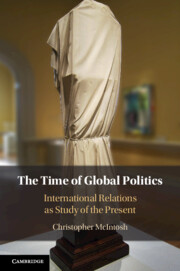
- Publisher:
- Cambridge University Press
- Online publication date:
- November 2023
- Print publication year:
- 2023
- Online ISBN:
- 9781009386838

How can we better relate and respond to the political times we inhabit? Temporal relationships play a central role in the questions at the heart of global politics, but political commentators and observers focus almost exclusively on the past as a means of predicting and preparing for the future. Christopher McIntosh argues that, although past events are meaningful for our collective future, the present remains vitally important. McIntosh emphasises the importance of the present as a conceptual resource and analytical category for thinking about international politics. The present, he suggests, places an orientation toward difference and a recognition of the human limits of understanding alongside an emphasis on process and change. This book will shift current thinking about prediction and better enable the use of knowledge about international politics to meaningfully and positively intervene in present-day concerns.
‘McIntosh brings a new temporal orientation for studies of international politics, importantly encouraging us to embrace a conscious humility in our work and selves, a welcomed intellectual move, not least given the challenges we all face.’
Kathryn M. Fisher - Johns Hopkins University
‘Time matters more than ever in global politics, but not always in the way we thought. Embracing the present as the theoretical and empirical locus of politics, Christopher McIntosh forges a novel way to understand the work of prediction and grand theorizing, the study of foreign policy and war, and the vocation of IR. Sure-handed and bold in equal measure, he takes readers on a lively journey through philosophy and social theory, shedding new light on the politics of time and the times of global politics along the way. IR scholars of all sorts should read this book, but beware: you may never look at time, the present, or IR the same again.’
Andrew Hom - University of Edinburgh
 Loading metrics...
Loading metrics...
* Views captured on Cambridge Core between #date#. This data will be updated every 24 hours.
Usage data cannot currently be displayed.